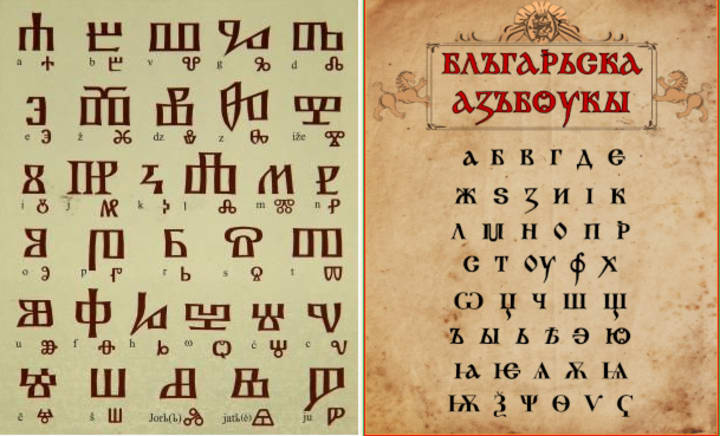Why do you still use this "Russian alphabet"?
What the heck do Bulgarians celebrate om the 24th May? Cyril and Methodius, who were Greeks created the Cyrillic alphabet. What is all the fuss about?

In Bulgaria, on the 24th of May, we celebrate the Day of Writing, the Cyrillic Alphabet, and Literacy. However, there is often confusion surrounding the origins of the Cyrillic alphabet, with some questioning its connection to Cyril and Methodius. I often hear:
"Wasn't the Cyrillic alphabet created by Cyril and Methodius who were Greeks? What the heck do Bulgarians celebrate on the 24th of May? What is all the fuss about?"
But in reality, they din't create it, and they weren't Greeks.
Actually, Cyril and Methodius had developed another alphabet called Glagolitic. In the image below, you can see the difference between Cyrillic and Glagolitic.

And they were at least half Slavic. According to historical records, their mother was a Slav. It was common for the Eastern Roman Empire to have people of different nationalities in positions of power, such as Slavs, Armenians, and many others.
Let's continue with the topic. The two brothers were commissioned by the Byzantine emperor Michael III to create the Glagolitic alphabet. The emperor's intention was to expand Byzantine influence among the newly Christianized Slavic states. Some historians suggest that his initial target was Bulgaria, but the prince of Great Moravia, a country that no longer exists today, requested the emperor to send a "bishop and teacher" to Moravia. Prince Rostislav's goal was to diminish the influence of the Vatican and the Germans on the population of Moravia.
Thus, the brothers journeyed to Moravia and successfully educated numerous students while supporting the translation of many holy books and documents into the Slavic language. The Glagolitic alphabet was employed for these translations.
Unfortunately, shortly after Cyril's death, a new prince, who held a hostile stance towards Byzantium, ascended to the throne in Moravia. He halted the progress of the students trained by the two brothers and began to persecute them. However, some of the students managed to escape to Bulgaria, where they were warmly welcomed by Tsar Boris the First. The disciples of Cyril and Methodius established new schools in Bulgaria, where they continued their important work. This significant development took place in the year 886.
However, the Glagolitic alphabet was eventually deemed too complex and challenging. As a result, a new alphabet began to emerge gradually, primarily based on the Greek alphabet, with only a few symbols borrowed from Glagolitic.
Initially, historians believed that this new alphabet originated in the Ohrid Academy, led by St. Clement of Ohrid. However, recent investigations indicate that the first instances of this new alphabet were actually found in documents created in the Preslav Academy. The Preslav Academy, situated in the then Bulgarian capital of Preslav, was under the leadership of Constantine of Preslav.
Over time, this alphabet gradually spread throughout the country. However, for a long period, both alphabets continued to be used side by side. Even centuries later, when Glagolitic had fallen out of use, certain Glagolitic letters occasionally appeared in texts written in Cyrillic script.
Regarding the name "Cyrillic," there are at least two hypotheses that exist. One suggests that it was named after Cyril in honor of his contributions to the alphabet's development, was named by his disciples. The other hypothesis relates to the fact that Cyril's civil name is Constantine. Constantine of Preslav, who played a significant role in the development of the Cyrillic alphabet, shares the same name. Consequently, later researchers became confused between the two figures named Constantine, leading to the alphabet being named after Cyril instead of Constantine of Preslav. Both hypotheses carry logical arguments and interpretations.
Approximately two centuries later, Bulgarian missionaries like Gregory Tsamblak, who eventually became the Metropolitan of Kyiv, played a crucial role in spreading the Cyrillic alphabet in Russian territory.
Thus, on the 24th of May, Bulgarians celebrate not only the creation of the Cyrillic alphabet on their own territory but also its subsequent dissemination among numerous other populations. This day also serves as a celebration of literacy and serves as an opportunity to honor the memory of Cyril and Methodius, as well as their dedicated disciples. It is a significant occasion that encompasses the rich historical and cultural heritage associated with the Cyrillic script.
Indeed, the greatest merit of Cyril and Methodius extends beyond the creation of an alphabet. Their most significant accomplishment lies in their efforts to protect the right of all nations to worship and write in their own languages. By advocating for the use of vernacular languages, they played a pivotal role in helping various nations preserve their independence and cultural identity.
Cyril, in particular, is regarded as one of the greatest diplomats of all time, owing to his triumph over the trilingual dogma. This dogma stipulated that Christianity could only be preached in Hebrew, Greek, and Latin. Cyril engaged in a renowned dispute in Venice with the Latin clergy, where he employed sound logic and compelling arguments. As a result, he emerged victorious in the dispute, thereby establishing that worshiping in languages other than the three specified above should not be deemed heresy. This achievement had far-reaching implications, as it opened the door for the use of local languages in religious practices and strengthened the linguistic and cultural diversity of Christian communities.
Finaly, I would like to extend my gratitude to the Danish Embassy in Bulgaria for acknowledging and recognizing Bulgaria's significant role in the creation of the Cyrillic alphabet.
Such recognition serves to highlight the historical and cultural contributions of Bulgaria and its people, as well as the enduring importance of the Cyrillic script. It is encouraging to see international recognition of Bulgaria's heritage and the impact of Cyril and Methodius' legacy on global language and literacy
About the Creator
Bozhan Bozhkov
Hi, dear readers. I'm Bulgarian. I used to be a physicist, that's my education, but now I work as a network administrator. For many years, I have been writing a blog, and have also written several fairy tales and short stories, and a novel.






Comments (2)
Fascinating account of the history of the Cyrillic alphabet and I feel suitably enlightened. Great photo of the biblioteka too!
Although most of this is like Alice in wonderland to me. It is a great story. Every culture has one of these stories to tell. We continue traditions without really knowing the root beginnings and even if it is worth continuing, Your stories are so well developed.